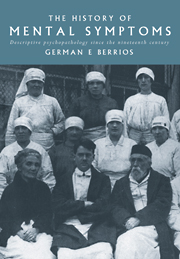Book contents
- Frontmatter
- Contents
- PREFACE
- ACKNOWLEDGEMENTS
- INTRODUCTION
- PART I The object of inquiry
- PART II Cognition and consciousness
- PART III Mood and emotions
- CHAPTER 11 Anxiety and cognate disorders
- CHAPTER 12 Affect and its disorders
- CHAPTER 13 The anhedonias
- PART IV Volition and action
- PART V Miscellany
- REFERENCES
- NAME INDEX
- SUBJECT INDEX
CHAPTER 12 - Affect and its disorders
from PART III - Mood and emotions
Published online by Cambridge University Press: 08 January 2010
- Frontmatter
- Contents
- PREFACE
- ACKNOWLEDGEMENTS
- INTRODUCTION
- PART I The object of inquiry
- PART II Cognition and consciousness
- PART III Mood and emotions
- CHAPTER 11 Anxiety and cognate disorders
- CHAPTER 12 Affect and its disorders
- CHAPTER 13 The anhedonias
- PART IV Volition and action
- PART V Miscellany
- REFERENCES
- NAME INDEX
- SUBJECT INDEX
Summary
For most of the nineteenth century, alienists had a preferential interest in the intellectual functions and their disorders; consequently, the semiology of ‘affectivity’ remained underdeveloped and contributed little to the emerging definitions of mental disease. This attitude was a legacy from Classical times when ‘passions’ were considered as the dark and lesser aspect of man. During the late eighteenth century there was a period when it seemed as if the passions might play an important role in the definition of man but this soon passed. Nineteenth century alienists were also limited in their capacity to deal with affective constructs by associationism and classical psychology. Such views markedly contrast with the extolling of emotions that characterized the Romantic movement.
This historical preference for the rational aspect of man is not, however, the only reason for the underdeveloped state of the semiology of affectivity. ‘Feelings’, ‘emotions’, ‘moods’, ‘affects’, and ‘passions’ are states whose experiential and behavioural components elude definition; to this day, for example, there is no agreement as to what should count as a valid report for an emotion. Secular efforts to capture these states in words only succeeded in creating a terminological palimpsest. During the second half of the century, however, there was a growing interest in affectivity as illustrated by the work of Brentano, the hypnotists, and later on by that of Janet and Freud.
A general preference for an intellectualistic account of mental disorder has not yet abandoned Western psychiatry. For example, depression, one of the few conditions considered as a ‘primary’ disorder of affect by nineteenth century alienists, is currently undergoing subtle revision.
- Type
- Chapter
- Information
- The History of Mental SymptomsDescriptive Psychopathology since the Nineteenth Century, pp. 289 - 331Publisher: Cambridge University PressPrint publication year: 1996



